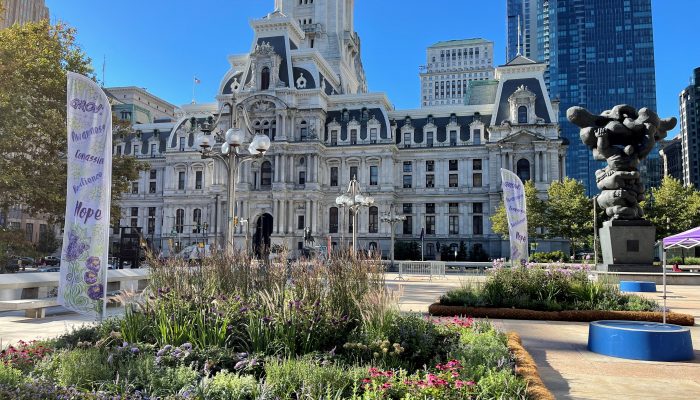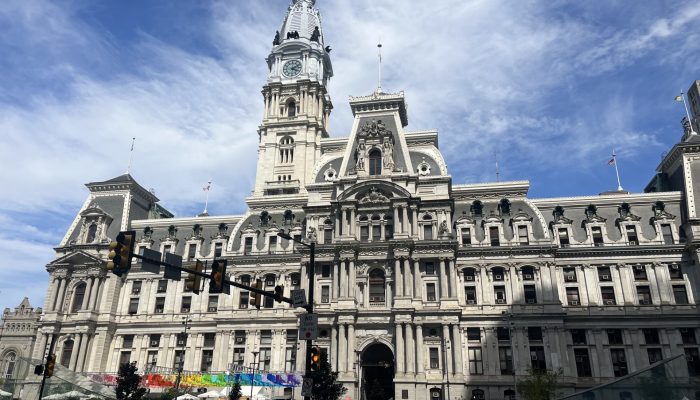On August 31st (International Overdose Awareness and Memorial Day), the City launched a pop-up overdose memorial garden in Thomas Paine Plaza, a large open space outside of the Municipal Services Building. Over 1,200 purple flowers were planted to recognize the Philadelphians lost to substance use. Throughout the 31 days that the garden was up, community members were welcome to attend events in the garden, learn more about substance use resources and supports, and tag flowers in honor of a lost loved one. By the end of the 31 days, over 575 flowers had been marked with names. Each tag was beautifully decorated by bereaved survivors.
The first of its kind not only in Philadelphia, but across the county, this multi-functional pop-up memorial garden was led by PhillyHEALS, the Department of Public Health’s Division of Substance Use Prevention and Harm Reduction’s Bereavement Care Program for substance use. Along with internal City partners, such as the Department of Behavioral Health and Intellectual disAbility Services, the Opioid Response Unit, and the Office of Arts, Culture, and the Creative Economy, as well as external partners, such as One Day at a Time, ThinkGreen LLC, and Pennsylvania Horticultural Society, PhillyHEALS was able to garner city-wide attention and momentum for this memorial garden. The goal for the creation of the memorial garden was to create a space for hope and healing for bereaved survivors, increase public awareness and decrease stigma, as well as to educate stakeholders and community members about the overdose crisis that his hit Philadelphia especially hard.
The pop-up garden’s opening ceremony on August 31st which featured Mayor Kenney, as well as guest speakers from the community who had personally been impacted by substance use and the loss of a loved one due to substance use, welcomed visitors to engage in the garden and learn about the upcoming events. In all, forty-two (42) events were held in the garden that touched on bereavement support, harm reduction, resource connection, advocacy, and more. Notable events included the Black Grief Matters panel, an interactive lecture on Co-Occurring Disorders, an Open Mic Night, an event bringing together community members and first responders, the Wellness Resource Fair, and more. The garden, which was staffed by ODAAT (One Day at a Time) employees, and the Philly HEALS team, was open daily and at least two individuals were on site to engage with visitors during open hours. Over 900 individuals were engaged through events and open hours in the garden and well over 2000 individuals walked through the garden.
Individuals came from all over the region to pay their respects in the memorial garden and many spoke to the importance of having such sites, which could humanize the overdose crisis and remind individuals that victims of the crisis are not forgotten and will continue to be loved and honored. Prior to tear-down of the garden, plants were given to bereaved survivors and remaining plants and materials (i.e., soil) went to community gardens, including Bensalem Community Butterfly Garden, The Garden at St. Paul UH Church, Tookany/Tacony Frankford Watershed project, and Pennypack Ecological Trust.
The pop-up garden was complemented by a virtual memorial site, which has received over 200 submissions. Individuals submitted photos and stories of loved ones lost to substance use. The site remains live and continues to receive submissions: www.substanceusephilly.com/memorial PhillyHEALS continues to provide bereavement support for loss due to substance use and interested individuals can sign up for their services at www.phila.gov/griefsupport.
The Health Department has developed an infographic demonstrating the success of the Memorial Garden. It is available for download here.



